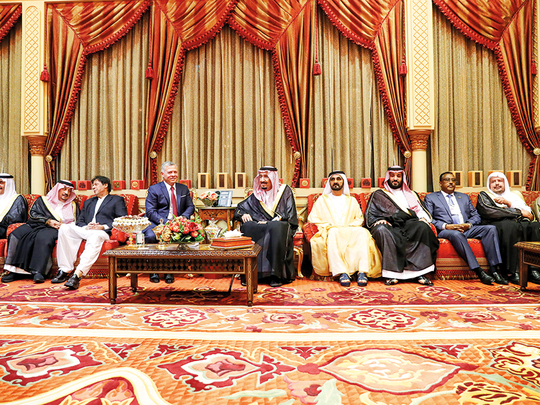
Abu Dhabi: Saudi Arabia will meet any demand that materialises due to disruption in supplies following US sanctions on Iran, the country’s energy minister said on Tuesday.
“We have to continue to monitor the market over the next two to three months, in January and beyond,” Khalid Al Falih said during a panel discussion at the Future Investment Initiative conference in Riyadh, which was broadcast live on twitter.
“We will decide if there are any disruptions from supplies and especially with Iran sanctions looming, we will continue with the mindset we have now, that is to meet any demand that materialises and ensure that customers are satisfied.”
Supplies from Iran, the third largest producer within Opec (Organisation of the Petroleum Exporting Countries) have been reducing in the last few months due to reimposition sanctions on the Islamic Republic by the US administration over its controversial nuclear enrichment programme.
Exports are expected to go down further as the US pressures countries to stop importing oil from Iran.
Al Falih also said oil-producing countries will rein in production if inventories grow uncontrollably and disrupt the markets.
“If supplies start increasing and inventories start building up, to a point where we get worried about repeating the 2014 scenario, then we will have the mechanism in place to reconvene and quickly rein in production and bring supply and demand in balance,” he said
On the current situation of the oil market, he said it was in a “good place” due to the combined efforts of Opec and non-Opec members to control production initially and lift the ceiling on output earlier this year.
“In June we lifted the ceiling on countries and said ‘produce as much as you can’. Our strategy worked two years ago when we pulled production to bring stability back and it worked in the last few months by easing production and removing anxieties about looming shortages,” he said referring to the agreement between Opec and non-Opec members that has been implemented since December 2016.
Oil-producing countries initially cut production by about 1.8 million barrels per day to prop up oil prices and changed the accord in June this year to cool oil markets as rising oil prices was dampening demand and creating problems for oil consuming countries like India and China.
Opec and its allies plan to extend their cooperation on oil supply when they meet in December in Vienna, according to Al Falih.
“We will basically ink an agreement among at least 25 countries, who are signatories to the agreement, and hopefully more countries will join. It will become an open-ended agreement and we will continue to monitor and work together to stabilise the market.”
The Saudi energy minister also said demand has uncertainties due to trade frictions and currency fluctuation among the developing economies and there is an unpredictable situation from supply in particular.
“We are watching constantly and the producing countries are pretty much agreed that what we have done in the last two years was for the good of producers, consumers and investors. We brought back the confidence and we are not going to let it slip from our hands so easily. We intend to stay on course.”
Speaking at the same conference, Sultan Ahmad Al Jaber, UAE Minister of State and Group CEO of the Abu Dhabi National Oil Company, said the global oil industry is about to break the historic milestone of consuming more than 100 million barrels of oil per day.
“And by 2040, we forecast that global consumption will climb by another 10 million per day, demonstrating that demand for hydrocarbons continues to gain strength amid major market expansions and a rising global GDP.”
As demand for petrochemicals rise by an approximate 60 per cent over the next two decades, Al Jaber expects the petrochemicals sector to become the single-largest driver of oil demand growth by 2050.
Saudi Aramco signed 15 Memoranda of Understanding (MoUs) and strategic and commercial collaborations valued at more than $34 billion with 15 international partner companies and entities from eight countries at the conference, according to a statement from the company.
The MOUs will support Saudi Aramco’s strategy across business units, including downstream, offshore, and engineering.
“It engages with companies representing eight countries including major businesses in France, China, the US, Japan, the UAE, the United Kingdom, South Korea and India,” the statement said.












